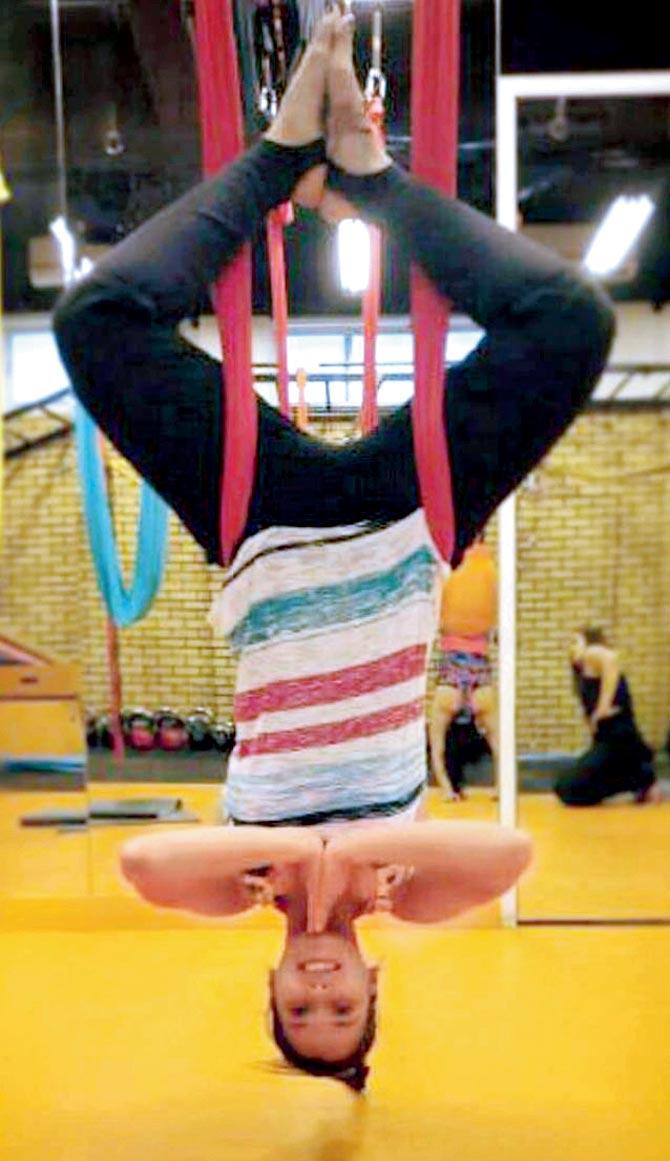As practitioners take long deep breaths to usher in International Yoga Day this week, purists and innovators debate whether alternative trends are overshadowing the traditional form


Racchana S Iyer
ADVERTISEMENT
Inching towards the helm of a long silken cloth, 27-year-old Aditi Vaswani pulls herself higher, her finesse evading the toil that seems like an inevitable part of the art. She appears indifferent towards the asymmetry plaguing her moves. The loop around her right leg doesn't mimic that on the left, the red cloth cuts her arms at uneasy folds. Suddenly, she stops, as though calculating her grip on the silk. In one swift moment, she throws herself upside down, plunging several inches lower, only to stop midway, safely secure in the comfort of her rope. 'See?' the instructional designer smiles, delighted with the belief that she has successfully justified her love for anti-gravity yoga.
Vaswani is among a growing lot of women who are constantly in search of alternative forms of the traditional practice, with reports about Kareena Kapoor Khan too giving anti-gravity yoga a shot to get rid of her post-pregnancy weight.

Aerial Yoga
Yogic detour
The demand for yoga with a twist is so high that even seasoned practitioners have been compelled to pay heed, albeit unwillingly. "The newer forms have people looking at yoga as a tool to lose weight. They are only being promoted for weight management and calorie burn," laments Iftekhar Ahmed Farooqui, a trainer at the Yoga Institute in Santacruz, one of the oldest in the city. "Yoga has to be an amalgamation of the mind, body and energy. You need to reach a pose, achieve it and hold it. Today, people want to focus on movement," he says, specifically referring to the unrealistic expectations that those propagating power yoga have created. "The additional forms hitting the market, like beach yoga, silk yoga and hot yoga, are only methods to make money."
It comes as a surprise then that Farooqui trains individuals in these glamourised forms. "I do it because I popularise yoga under the name of these additional trends," he reasons. "While I may focus on strenuous exercises during a class of power yoga, or flexibility work in hot yoga, to meet clients' demands, I will also take them through the principles of the traditional art. And that, I think, is how trainers must attempt to teach individuals, even while selling the offbeat forms."
Thirty-four-year-old Racchana S Iyer, founder of Mumbai-based Revival Yoga Studio, however, believes that such derivatives have only stemmed from people's interest, and must be encouraged to rope in enthusiasts to learn the original form. "Those inclined towards fitness came up with power yoga, those who love movement devised Vinyasa Flow, while aerial dance enthusiasts created anti-gravity yoga. All these forms include one or another principle of yoga, and can still help people," says the practitioner, who is quick to point out that the benefits of these offshoots are limited unless individuals are motivated to learn the original form. "They add an element of interest, but can't compete with the traditional practice. It's a marketing strategy. You won't reap long-term benefits if you don't grow, both physically and mentally. These forms will enhance your movement, not experience."

Mew-ga
Alternate cool
At a popular Andheri cafe, Priti Jhavar conducts hour-long 'Mew-ga' sessions in the midst of a dozen felines, who leap and twirl around practitioners as they perform the art. "The cats even have their favourite mats. There is certainly a difference between those students who attend the Mew-ga class and those who practise traditional yoga. It is not in the manner in which they execute a particular asana, but in the warmth with which they look at animals," says the Ashtanga yoga practitioner.
However, Jhavar doesn't consider these additional forms a means to lure the younger generation. "People don't see yoga as something that those in their 60s practise. Today, a whole lot of youngsters are taking to the traditional practice also."
Vaswani seconds Jhavar's assertion, adding that she arrived at her decision of learning anti-gravity yoga after practising the traditional form for two years. "Yoga taught me to be happy, and by permitting myself to blend it with a form of dance I enjoy, I've only learnt to be happier and get physically stronger."
 Subscribe today by clicking the link and stay updated with the latest news!" Click here!
Subscribe today by clicking the link and stay updated with the latest news!" Click here!






